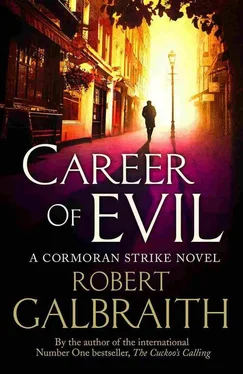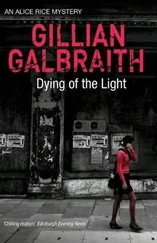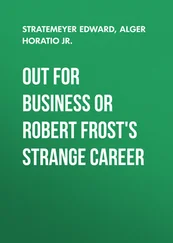“Yes, Matt’s jealous,” she said at last.
“I’m assuming he’s got no reason?”
“Of course not!” said Robin hotly. She felt betrayed. Her mother was always on her side, always—
“There’s no need to get fired up,” said Linda, unruffled. “I wasn’t suggesting you’d done anything you shouldn’t.”
“Well, good,” said Robin, eating the scone without noticing it. “Because I haven’t. He’s my boss, that’s all.”
“And your friend,” suggested Linda, “judging by the way you talk about him.”
“Yes,” said Robin, but honesty compelled her to add, “it’s not like a normal friendship, though.”
“Why not?”
“He doesn’t like talking about personal stuff. Blood out of a stone.”
Except for one notorious evening — barely mentioned between them since — when Strike had got so drunk he could hardly stand, voluntary information about his private life had been virtually nonexistent.
“You get on well, though?”
“Yeah, really well.”
“A lot of men find it hard to hear how well their other halves get on with other men.”
“What am I supposed to do, only ever work with women?”
“No,” said Linda. “I’m just saying: Matthew obviously feels threatened.”
Robin sometimes suspected that her mother regretted the fact that her daughter had not had more boyfriends before committing herself to Matthew. She and Linda were close; she was Linda’s only daughter. Now, with the tearoom clattering and tinkling around them, Robin realized that she was afraid that Linda might tell her it wasn’t too late to back out of the wedding if she wanted to. Tired and low though she was, and in spite of the fact that they had had several rocky months, she knew that she loved Matthew. The dress was made, the church was booked, the reception almost paid for. She must plow on, now, and get to the finishing line.
“I don’t fancy Strike. Anyway, he’s in a relationship: he’s seeing Elin Toft. She’s a presenter on Radio Three.”
She hoped that this information would distract her mother, an enthusiastic devourer of radio programs while cooking and gardening.
“Elin Toft? Is she that very beautiful blonde girl who was on the telly talking about Romantic composers the other night?” asked Linda.
“Probably,” said Robin, with a pronounced lack of enthusiasm, and in spite of the fact that her diversionary tactic had been successful, she changed the subject. “So you’re getting rid of the Land Rover?”
“Yes. We’ll get nothing for it, obviously. Scrap, maybe... unless,” said Linda, struck by a sudden thought, “you and Matthew want it? It’s got a year’s tax left on it and it always scrapes through its MOT somehow.”
Robin chewed her scone, thinking. Matthew moaned constantly about their lack of car, a deficiency he attributed to her low salary. His sister’s husband’s A3 Cabriolet caused him almost physical pangs of envy. Robin knew he would feel very differently about a battered old Land Rover with its permanent smell of wet dog and wellington boots, but at one o’clock that morning in the family sitting room, Matthew had listed his estimates of the salary of all their contemporaries, concluding with a flourish that Robin’s pay lay right at the bottom of the league table. With a sudden spurt of malice, she imagined herself telling her fiancé, “But we’ve got the Land Rover, Matt, there’s no point trying to save for an Audi now!”
“It could be really useful for work,” she said aloud, “if we need to go outside London. Strike won’t need to hire a car.”
“Mm,” said Linda, apparently absently, but with her eyes fixed on Robin’s face.
They drove home to find Matthew laying the table with his future father-in-law. He was usually more helpful in the kitchen at her parents’ house than at home with Robin.
“How’s the dress looking?” he asked in what Robin supposed was an attempt at conciliation.
“All right,” said Robin.
“Is it bad luck to tell me about it?” he said and then, when she did not smile, “I bet you look beautiful, anyway.”
Softening, she reached out a hand and he winked, squeezing her fingers. Then Linda plonked a dish of mashed potato on the table between them and told him that she had given them the old Land Rover.
“What?” said Matthew, his face a study in dismay.
“You’re always saying you want a car,” said Robin, defensive on her mother’s behalf.
“Yeah, but — the Land Rover, in London?”
“Why not?”
“It’ll ruin his image,” said her brother Martin, who had just entered the room with the newspaper in his hand; he had been examining the runners for that afternoon’s Grand National. “Suit you down to the ground, though, Rob. I can just see you and Hopalong, off-roading to murder scenes.”
Matthew’s square jaw tightened.
“Shut up, Martin,” snapped Robin, glaring at her younger brother as she sat down at the table. “And I’d love to see you call Strike Hopalong to his face,” she added.
“He’d probably laugh,” said Martin airily.
“Because you’re peers?” said Robin, her tone brittle. “Both of you with your stunning war records, risking life and limb?”
Martin was the only one of the four Ellacott siblings who had not attended university, and the only one who still lived with their parents. He was always touchy at the slightest hint that he underachieved.
“The fuck’s that supposed to mean — I should be in the army?” he demanded, firing up.
“Martin!” said Linda sharply. “Mind your language!”
“Does she have a go at you for still having both legs, Matt?” asked Martin.
Robin dropped her knife and fork and walked out of the kitchen.
The image of the severed leg was before her again, with its shining white tibia sticking out of the dead flesh, those slightly grubby toenails whose owner had meant, perhaps, to clean or paint before anybody else would see them...
And now she was crying, crying for the first time since she had taken the package. The pattern on the old stair carpet blurred and she had to grope for the doorknob of her bedroom. She crossed to the bed and dropped, face down, onto the clean duvet, her shoulders shaking and her chest heaving, her hands pressed over her wet face as she tried to muffle the sound of her sobs. She did not want any of them to come after her; she did not want to have to talk or explain; she simply wanted to be alone to release the emotion she had tamped down to get through the working week.
Her brother’s glibness about Strike’s amputation was an echo of Strike’s own jokes about the dismembered leg. A woman had died in what were likely to have been terrible, brutal circumstances, and nobody seemed to care as much as Robin did. Death and a hatchet had reduced the unknown female to a lump of meat, a problem to be solved and she, Robin, felt as though she was the only person to remember that a living, breathing human being had been using that leg, perhaps as recently as a week ago...
After ten minutes’ solid weeping she rolled over onto her back, opened her streaming eyes and looked around her old bedroom as though it might give her succor.
This room had once seemed like the only safe place on earth. For the three months after she had dropped out of university she had barely left it, even to eat. The walls had been shocking pink back then, a mistaken decorating choice she had made when she was sixteen. She had dimly recognized that it did not work, but had not wanted to ask her father to repaint, so she had covered the garish glare with as many posters as possible. There had been a large picture of Destiny’s Child facing her at the foot of the bed. Though there was nothing there now but the smooth eau de nil wallpaper Linda had put up when Robin left home to join Matthew in London, Robin could still visualize Beyoncé, Kelly Rowland and Michelle Williams staring at her out of the cover of their album Survivor . The image was indelibly connected with the worst time of her life.
Читать дальше











